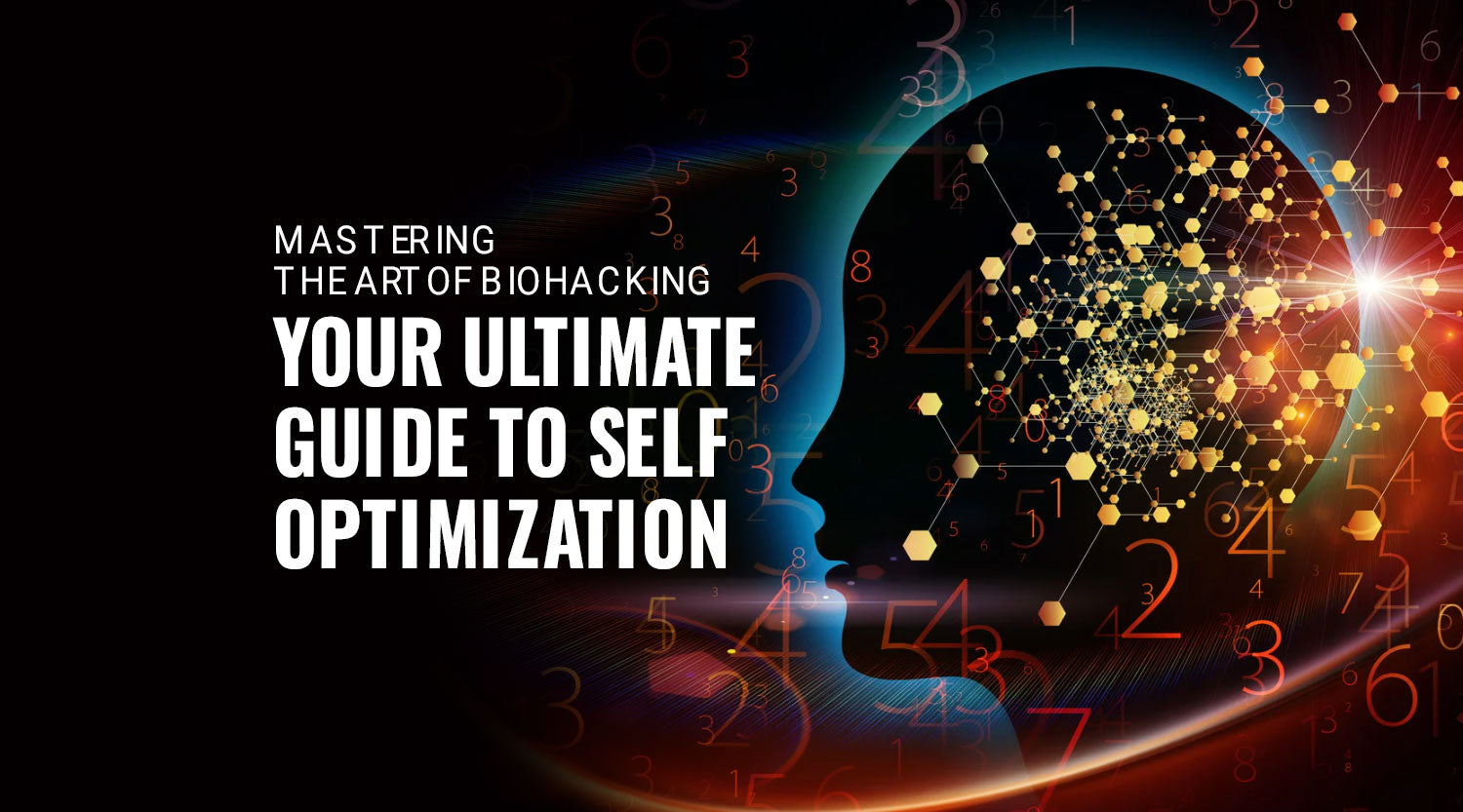
Unveiling Biohacking: How Self Optimization and Glycine Supplementation Can Redefine Wellness
In the modern age, where the quest for peak performance and well-being is relentless, biohacking has emerged as a powerful movement. The idea of hacking the body and mind to unlock optimal health has gained considerable traction, thanks to technological advances, scientific discoveries, and an ever-growing interest in self-optimization. Among the myriad strategies involved in biohacking, glycine supplementation stands out for its profound impact on overall health. In this blog, we will explore the essence of biohacking, the benefits of glycine supplementation, and how these two can work together to revolutionize wellness.
What is Biohacking?
At its core, biohacking refers to the practice of using science, technology, and lifestyle changes to enhance the body and mind. Biohacking is also known as DIY biology, encompassing many activities, from intermittent fasting and sleep optimization to nootropic use and gene editing. While some aspects are futuristic and controversial, others have become mainstream tools for everyday self-improvement.
The Three Pillars of Biohacking:
- Nutrition: Optimizing diet, macronutrient intake, and supplementation to fuel peak physical and mental performance.
- Exercise: Utilizing personalized fitness routines, strength training, and cardio strategies to enhance physical stamina, longevity, and mental health.
- Sleep and Recovery: Prioritizing high-quality sleep, stress management, and recovery techniques to enhance overall well-being.
Biohackers often adopt personalized approaches based on individual goals and biological factors, constantly tweaking and experimenting to maximize results. Whether you aim to lose weight, increase productivity, or sharpen cognitive functions, biohacking empowers individuals to take control of their health with data-driven insights.
Glycine: A Key Player in Biohacking
Glycine, an amino acid, is often overlooked when discussing biohacking supplements. It plays a critical role in many biological processes, from protein synthesis to neurotransmitter function, and is vital for maintaining cellular health. Glycine is naturally found in collagen-rich foods, but many biohackers choose to supplement it to achieve more significant health benefits.
Glycine’s Role in the Body:
- Supports Protein Synthesis: Glycine is an amino acid essential for creating proteins, including collagen, which is crucial for skin, joint, and muscle health.
- Improves Sleep Quality: Glycine has been shown to improve sleep by regulating the body’s internal temperature, allowing for deeper and more restful sleep.
- Enhances Cognitive Function: Glycine is an inhibitory neurotransmitter in the brain that helps to promote mental clarity, calmness, and focus.
- Aids Detoxification: Glycine plays a role in detoxifying the body by supporting liver function and helping neutralize harmful substances.
- Promotes Metabolic Health: Research shows glycine can improve insulin sensitivity, reduce inflammation, and support metabolic processes, which are vital for overall health and longevity.

How Glycine Supplementation Redefines Wellness
- Improved Sleep and Recovery
Quality sleep is a cornerstone of biohacking, directly impacting cognitive function, mood, immune health, and muscle recovery. Glycine plays an essential role in this by influencing serotonin and melatonin production, hormones crucial for regulating sleep cycles. Studies show that glycine supplementation before bed can help lower core body temperature, facilitating deeper sleep and enhancing recovery after physical exertion.
- Enhanced Cognitive Function
Glycine is known for its ability to calm the brain and promote focus, thanks to its role as a neurotransmitter. For biohackers aiming to optimize their mental capacity, glycine can be particularly beneficial. Supplementing with glycine can enhance memory, improve focus, and reduce mental fatigue, making it a powerful tool for both students and professionals looking to sharpen their cognitive edge.
- Anti-Aging and Skin Health
Collagen, the protein that provides structure to skin, joints, and connective tissues, is rich in glycine. Supplementing with glycine helps support collagen production, leading to improved skin elasticity, fewer wrinkles, and stronger hair and nails. For biohackers who prioritize anti-aging strategies, glycine becomes indispensable in promoting youthful skin and reducing signs of aging.
- Support for Muscle Growth and Repair
Since glycine is a key component of protein synthesis, it plays a vital role in muscle growth and repair. For those biohacking their fitness routines, glycine supplementation can expedite muscle recovery after intense workouts, reduce inflammation, and even enhance endurance. Athletes and fitness enthusiasts stand to benefit significantly from incorporating glycine into their supplementation stack.
- Boosting Metabolic Health and Longevity
Biohackers with an eye on longevity will appreciate glycine's role in improving metabolic health. Glycine has been shown to enhance insulin sensitivity, reduce oxidative stress, and lower inflammation levels in the body—all of which are linked to metabolic diseases and aging. By keeping insulin levels balanced and reducing inflammation, glycine supplementation can promote a longer, healthier life.
Integrating Glycine Supplementation into Your Biohacking Routine
When considering glycine supplementation as part of your biohacking journey, it’s essential to follow best practices to maximize its benefits:
- Dosage: The optimal daily dose for glycine supplementation varies, but many studies suggest taking 3-5 grams per day for sleep and cognitive benefits. Higher doses might be recommended for more targeted interventions like muscle repair or skin health.
- Timing: Glycine is most effective before bedtime for improved sleep. However, it can also be consumed during the day to boost cognitive function.
- Pairing with Other Biohacking Practices: Glycine supplementation works best when combined with other biohacking practices, such as intermittent fasting, a ketogenic diet, or exercise regimens. Combining glycine with collagen peptides or nootropic supplements can further enhance its benefits.
The Future of Biohacking and Glycine
As biohacking continues to grow, so does the exploration of new ways to optimize the body and mind. Glycine’s well-researched benefits make it a staple in many biohacking protocols. With its wide-ranging effects, from improving sleep and cognitive function to supporting metabolic health and anti-aging, glycine offers a versatile tool for self-optimization.
In a world where people are constantly seeking new ways to maximize their potential, glycine supplementation represents a practical and powerful way to redefine wellness. Whether you're looking to sharpen your mind, improve your recovery, or promote longevity, glycine provides a proven, science-backed strategy that fits seamlessly into the biohacker’s toolkit.
In conclusion, Biohacking is reshaping the future of health and wellness by empowering individuals to take control of their biology. With glycine supplementation, biohackers can tap into many benefits, from better sleep and cognitive function to enhanced skin health and longevity. Incorporating glycine into your routine is a simple yet profound way to redefine wellness and achieve your self-optimization goals.
References:
- Yamadera, Wataru, et al. "Glycine ingestion improves subjective sleep quality in human volunteers, correlating with polysomnographic changes." Sleep and Biological Rhythms 5 (2007): 126-131. https://link.springer.com/article/10.1111/j.1479-8425.2007.00262.x
- Nosaka, Kazunori. "Muscle damage and amino acid supplementation: Does it aid recovery from muscle damage?." International SportMed Journal 8.2 (2007): 54-67. https://journals.co.za/doi/abs/10.10520/EJC48612
- Li, Peng, and Guoyao Wu. "Roles of dietary glycine, proline, and hydroxyproline in collagen synthesis and animal growth." Amino acids 50 (2018): 29-38. https://link.springer.com/article/10.1007/s00726-017-2490-6
- Adeva-Andany, M., et al. "Insulin resistance and glycine metabolism in humans." Amino Acids 50 (2018): 11-27. https://link.springer.com/article/10.1007/s00726-017-2508-0
- Williams, Michael B., et al. "Effects of recovery beverages on glycogen restoration and endurance exercise performance." The Journal of Strength & Conditioning Research 17.1 (2003): 12-19. https://journals.lww.com/nscajscr/abstract/2003/02000/Effects_of_Recovery_Beverages_on_Glycogen.3.aspx
